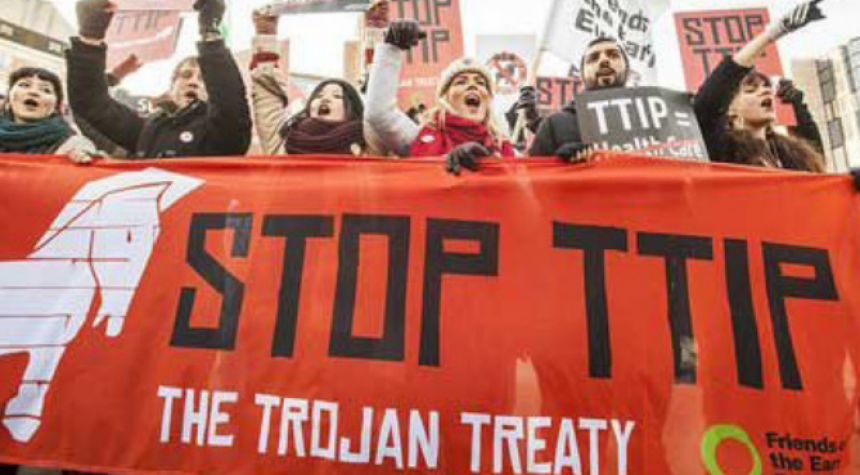
The European Union (EU) and the United States (US) are moving ahead with the opaque negotiation of Transatlantic Trade and Investment Treaty (TTIP), an agreement designed not for the welfare of the citizens of both regions, but rather for the greater good and impunity of large multinational corporations. Impunity, yes, because much of what lurks in the pact of capital involves limiting, if not ending, legal restrictions that are subject to the supervision of States. It other words, trying to remove the protections that now protect them, for better or worse, people in its various facets: as consumers, as workers, as users of goods and services.
The TTIP is based on lies and lives as lies. It is said that opening up markets on either side of the Atlantic will generate more business, which does not have to be false. What is false is that there should be openness in what is being proposed, in which there is a new twist at every turn, the balance in economic power is removed, while citizens are more and more imprisoned and converted into mere pawns in the system, defenceless and enslaved, without a state able to assume its responsibility, which is simply there to guarantee the rights of the most against the privileges of the few.
In their self-interested way, some advocates of the TTIP have come to say that those who reject it refuse to progress and in our criticism of the Treaty lies an almost visceral hatred or anything that gets us closer to Washington. Nothing is further from reality. We are at a critical time for the European people, for the American people time and, I dare say, for everyone in the world. Or we stand up to what lies ahead (this treaty is not an end but more a means to strip many of the rights that have cost lives and suffering) or walk towards a global society of discomfort. In fact, the progress they speak of is not for most of the people, but only for a select group that uses more resources every day, as demonstrated by the increase in inequality.
"Free" is a euphemism
Not surprisingly, the EU and the US are in tune on the elimination of barriers to "free" trade and the removal of a legislative framework that, to date, attempts to defending the interests of citizens. It is not surprising that, for some time now, on either side of the Atlantic, the economic and financial powers largely dominate the political decision-making, thanks to the bipartisanship that has given coverage and protection to the point of becoming lackey of those who should limit, control and regulate, in pursuit of the general good.
When this "free" trade, between quotation marks, has to do with what, from my point of view, is still a euphemism: it is not to eliminate barriers to international transactions but to eliminate regulations that are there to protect consumers, as such, the citizens in their rights and, if you ask me, even the States' sovereignty.
The truth is that if ordinary people are asked, in the street, who live their lives, have family and work, few people will dare to say anything about the TTIP. Nor is this surprise: first, due to the opacity in the negotiations; later, in Spain, because PP, PSOE, CiU and UPyD have allied to steal from the public the opportunity to get to know this agreement in depth, and this has led them to refuse to take it to a referendum.
The media does not help, as they have become a tool of big business, since they are owned by these groups and clusters and therefore their voice to inform and deform. The information, with few exceptions, is scarce, too brief and rarely critical: it is given the same emphasis as would be given to the winning number of the ONCE lottery ticket. Being taken out of context assures us, without any contrast or source, that 2 million jobs will be created. Of course, no information about the quality of that employment, that is, their labour and economic conditions, is provided. Nor it is clarified that other sources say the exact opposite, though the silenced provider of the information is the European Commission (EC), that a report has already alerted us to the true risk of a global loss of employment. Loss, and that is not in the EC, which will also be of labour rights, as the TTIP allows recruitment in one country but linking them to other legislation. Or what amounts to the same, the door to full deregulation opens, in what it will be allowed, for example, in Sweden they can contract people according to the looser labour laws of Wisconsin, let's say.







